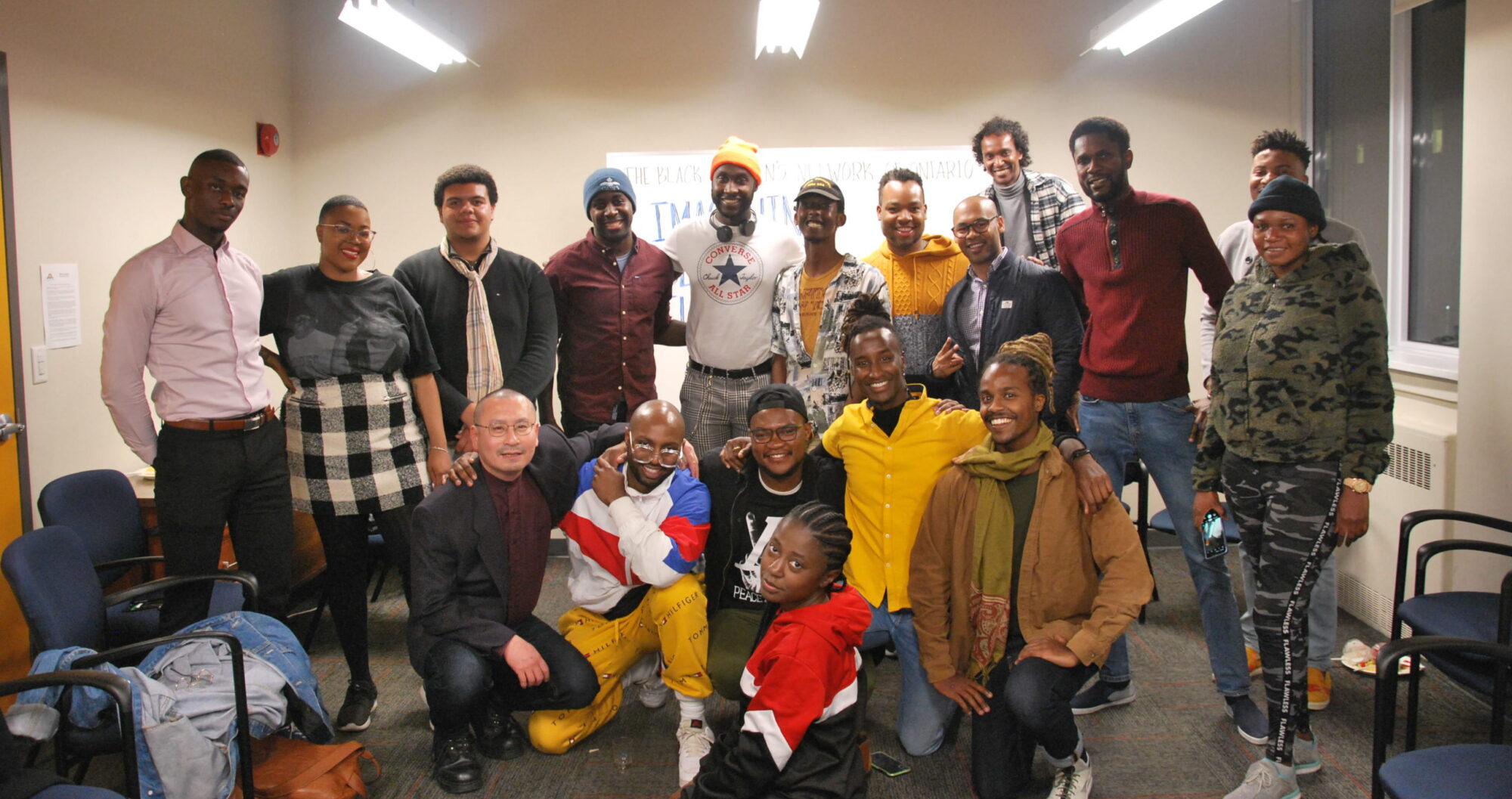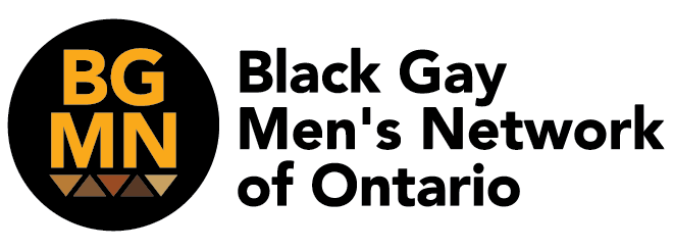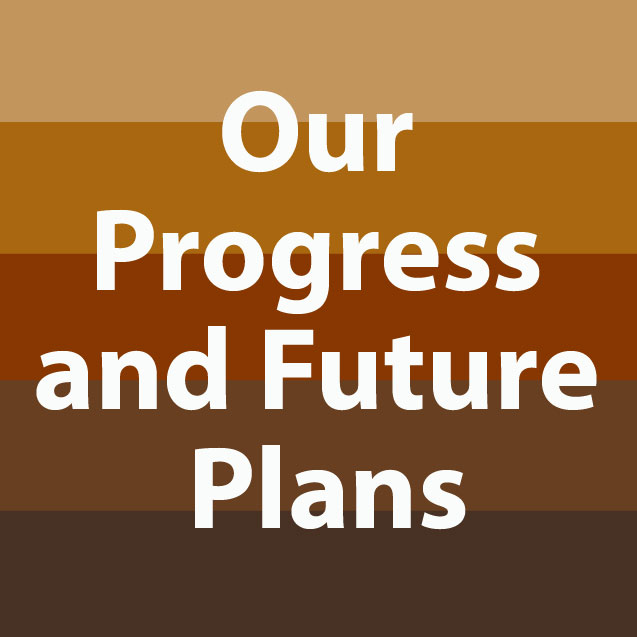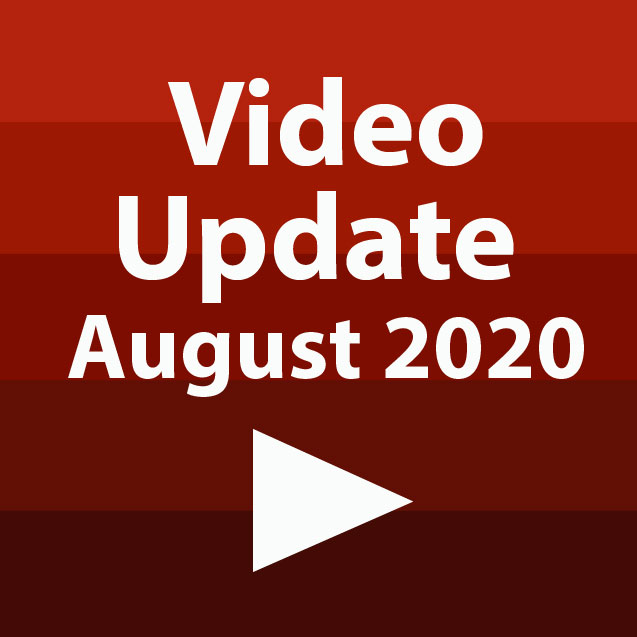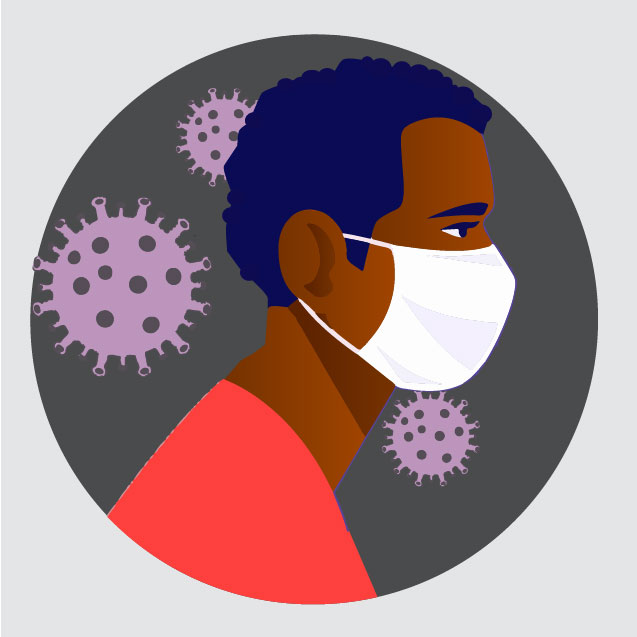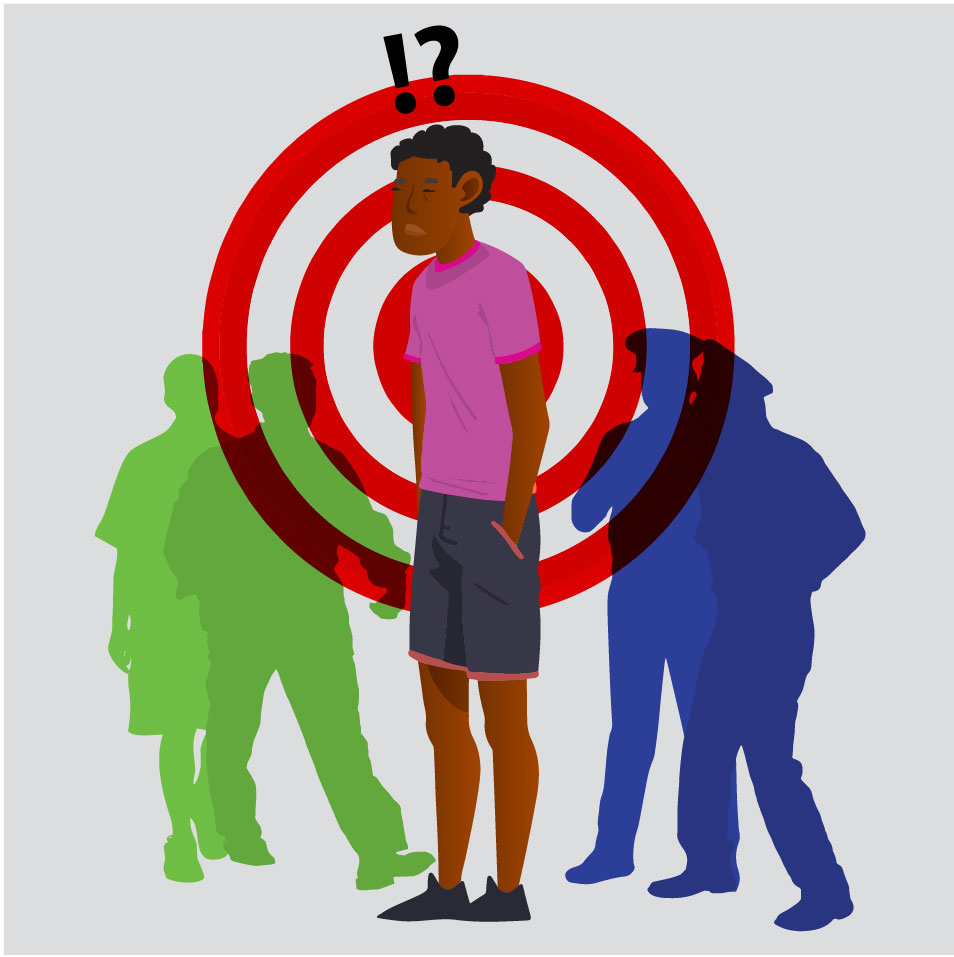By David Lewis Peart
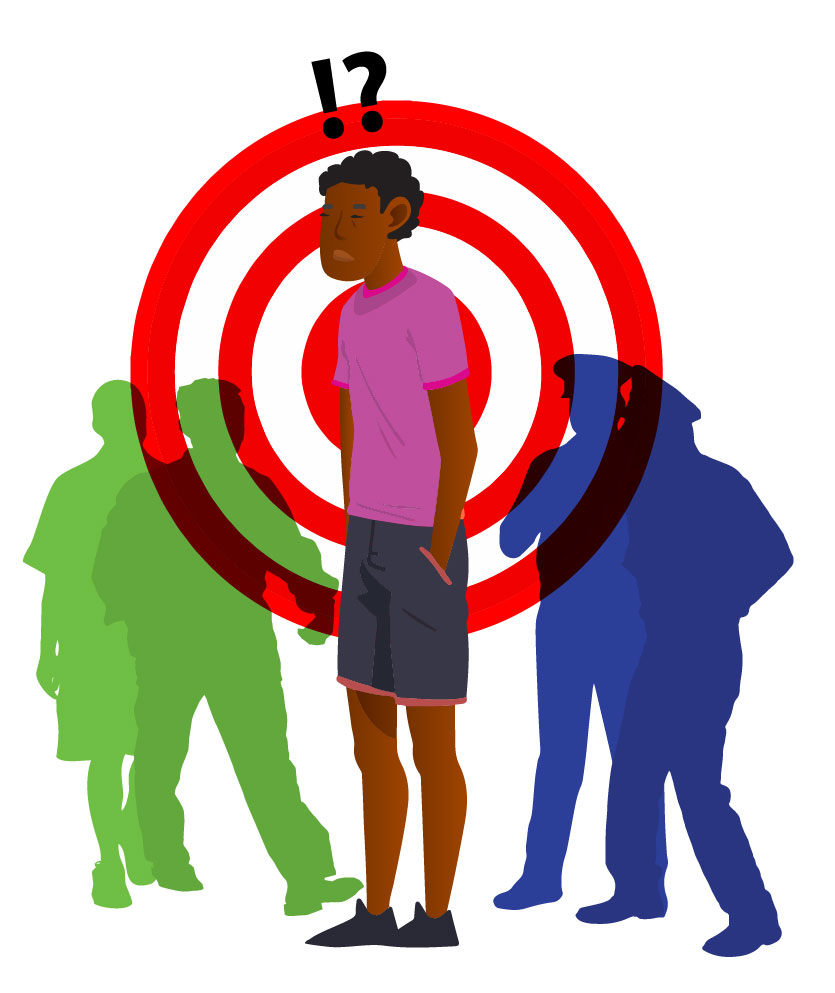
“Hey Faggot,” the group of mostly white, with a sprinkling of Asian boys, shouted. They had followed my girlfriends and I from Fez Batik, a now long gone nightclub on Peter Street, most recently, a homeless shelter surrounded by condominiums.
“Hey faggot,” they repeated as we turned onto Queen Street West. “We’re gonna fuck you up,” said the lead boy, a Gap-wearing prepster, as his group descended on us.
I was with two girlfriends; one white, the other Black.
The Black girl was a new friend, the white girl I had known for some time. We had enjoyed one of those nights that one has in their late teens and early twenties, full of possibility and absent of responsibility.
My body registered those boys’ words before my ears did. That familiar, full-body knowing that most of us gay and bi men come to recognize from before we even truly understand the meaning behind them. The tensing of shoulders, elevator drop feeling in your stomach, the tingle of toes and fingertips, and the bated breath. A defence posture. A readiness for the fight or flight. “Faggot, punk, queer, sissy, bulla man, maricon, batty boy, fish.”
The boys barreled down on us. I glanced back and felt her gaze on the side of my face; we locked eyes. This Black, straight girl, this girl that I had met only months before. This girl, to be honest, who still cringed through episodes of Will and Grace and often remarked when confronted with me, “I just don’t get it.” But here on this street, with these boys, and my white girlfriend having disappeared, it was just us.
We squared our shoulders, balled our fists and got ready for the throw-down that never happened.
“Take him down, take him down!” men’s voices barked before I felt their hands on my shoulders and limbs; all the breath pushed out my chest, my body flung in the air. I hit the pavement with a thud.
A steady stream of cuss words and spittle showered me as four policemen; three white, one Asian, held me firmly to the ground. The lead officer, a blond young man, barely hid his eagerness as his knee lodged itself firmly into the crook of my neck.
“He’s gay, he’s gay!” my new girlfriend shrieked as the gang of men sat atop me. Without needing to ask her, I understood. She hoped, perhaps like many do, that those words and that identity might undo the perceived insignificance of my other identity for these men. My Blackness. My body sprawled out across the sidewalk as passing motorists slowed down to take in the sight.
‘Another Black man up to no good, no doubt,’ I assumed they thought. Ashamed, I watched as one driver after another slowed down and gawked before moving along. ‘Nothing to see here. Business as usual.’
“Sir, your knee is on my neck,” I said, repeating that sentence over and over. It became a chant or a prayer; polite, clear, respectable, hopeful.
The white and Asian boys from Fez Batik were sent on their way, but not before one of the officers asked them if they were okay and apologized for the scene.
I laid there pinned to the sidewalk at the intersection of Queen and John Street for over an hour, handcuffed and facedown. One bold officer openly flirted with my new friend, the others went through my pockets. “A concealed weapon!” they proudly exclaimed.
I carried bear spray on me after two incidents walking through the gay village. I had been accosted by street-involved men some months before while out with friends. Both occurrences were motivated by a mix of poor mental health and homophobia.
I laid there. They flirted, laughed and scribbled notes. A senior officer was called to the scene. He arrived on horseback.
Nearly two hours later they pulled me up and released me.
The blonde officer, after receiving a bit of a scolding from his annoyed superior, undid my handcuffs sheepishly. Before sending us on our way, the officer warned me to “stay out of trouble.”
Out of nowhere the white girlfriend appeared. The last two hours had been such a blur, I nearly forgot she was with us. She apologized for ducking out when the police arrived. “I didn’t want any problems,” she said. I had no words.
She left, and my Black girlfriend and I continued our walk in absolute silence. As we got to Yonge Street a dam broke inside me and a flood of emotions became visible as hysterical sobbing erupted from me.
She held me right there on the street as I cried.
That evening, at the intersection of Queen and John Street almost 20 years ago, I learned a valuable lesson about my queerness, my Blackness, the intersection of these two identities, and how vulnerable and violently so, they each were in the world.
Black men, queer and trans men included, know intimately what it means to be policed. And know intimately what that policing does to our bodies and lives. It’s violent, it’s exacting, it’s erasing, and it’s absolute.
This isn’t just George Floyd’s story.
This is Tony McDade, it’s Elijah McClain, it’s Lashano Gilbert.
This isn’t just George Floyd’s story.
We queer and trans Black men know and hold this story too. His “I can’t breathe” is ours.
We balance the tightrope walk of anti-Black racism and homohatred.
We learn to code-switch, to compartmentalize one self at the betrayal of the other. We do it in order to survive. It’s our safety strategy.
That night before Fez Batik, I changed and rechanged my shirt at what seemed like ten times before deciding on the one I wore. The shirt that by the end of the night, and that encounter with the cops, had been torn straight down the front. I had chosen it because it was nondescript. Not too flashy. Not too gay.
These are our strategies of safety. The ones learned from young in our homes with dad and mum, or out at the church and mosque, with the boys in the playground, on the ballcourt, walking the hallways at school or on the bus rides back to the neighbourhoods where we watch our backs for both cop cars and those other officers of the established order, those boys and men, sometimes our very brothers, who look like us but remind us daily that we are not quite right. “Faggot, punk, queer, sissy, bulla man, maricon, batty boy, fish.”
We navigate race and gender expectations; for those that can, we blend in. We navigate hate and discomfort, and learn to internalize our own. Barbershops are battlegrounds. Bars, bathhouses and chat rooms are too. Too Black, too femme. Not “Black” enough. Too little. Too much.
It makes us sick. It pushes us down and out and into the world on our own; like motherless children but not quite orphans, having houses but not quite homes.
It shows up as our ever-present anxiousness. That sense of dread. Of hypervigilance, always keeping one ear open and one eye cocked for the next and seemingly inevitable assault on our Blackness or our queerness, or both. These bodies weather this “weather” as theorist Christina Sharpe calls it: the climate of anti-Blackness.
This weather and its weight leave us changed.
It makes us sad
It makes us lonely
It makes us rageful
It silences us
And it’s exhausting. The weight of anti-Blackness and the weight of homohatred wear us out.
It at times, more times than many of us can bear to remember, very literally seems to end our lives.
I didn’t know George Floyd. I didn’t know Tony McDade. I didn’t know Elijah McClain. But I did know Lashano Gilbert. Not well, but well enough to know he didn’t deserve to die the way the newspapers said he did. His life ended by some police officers intervening on a suspected mental health episode.
I don’t know and can’t speak to that story. I remember the tall, dapper, funny and smart young man. Smart enough to have attended medical school in his home country. Funny, dapper and kind enough to have collected the wide array of friends that turned out to the small memorial held for him in Toronto.
The newspapers remarked that some of his last words that fatal night with those cops were “I can’t breathe” All of the fullness and complexity of this man was inconsequential in that crucial and final moment. Our lives are reduced to headlines. Our voluminous stories left only to the most sensational chapters.
These are the realities for Black men. These are the realities for Black gay and trans men too.
And still in the midst of it, we find each other. We don’t always get it right. It can show up as our unhealthy choices and our conflicts. Being queer doesn’t exclude our masculinity from toxic traits, or make us immune from reproducing the same violences and harms we ourselves have survived. We know this and see this in the community and our relationships. We fight. We namecall. We call out. We whisper. We exile. We struggle against ourselves and each other. We encounter illness and disease, addiction, mental health, shame and self-doubt. I’ve known this and seen this in the community, and in myself.
But still, we find each other. And love, and fuck and free up. And heal. It’s Blockorama Sunday, it’s a lip-synched word and a witness with Michelle Ross at Crews & Tangos, it’s DJ Blackcat, the Kiki Ballroom and The House of Munroe, it’s the end of summer and our broad shoulders taking shade and holding corners at Hanlan’s Point beach and sometimes in the backwoods.
It’s us marching too. Standing together, fists in the air and hands on our heart. Or holding signs reminding that Black Lives Matter. All Black Lives. Ours included.
It’s the less visible but just as radical stuff too. The work we do correcting the missteps and mistakes, and unlearning what we’ve been taught, doing our best to do and be better.
It’s us holding ourselves and each other accountable. It’s us holding each other and ourselves in grace.
It’s choosing to survive and thrive despite all kinds of odds. It’s being willing to be “odd,” honest, and the odd man out.
Some of us do that in a pair of heels and a face beat for the gods in the full light of day, or clasping our lover’s hand after exiting the block of seeming safety Church and Wellesley provides. It’s the unapologetic, unconventional and non-conformed us. It’s our broad-lipped mouths finding room for the intersection of us and each other, the salt and sweetness on our tongues and in our stories, heavy and unashamed.
